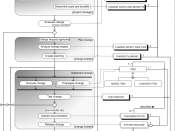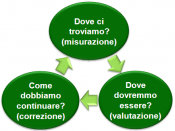Topic 1: Business Management And Change
Management Theories
Classical/scientific approaches
Approach Specialised efficiency-oriented systems of management
Timing From the turn of the century, well into the 1930s. A legacy of the Industrial Revolution and the social structure of the times: a potentially large workforce of relatively uneducated, disempowered people.
Management principles Hierarchical systems based on principles of specialisation, centralisation and formality.
Specialised tasks exist in specialised departments, with responsibility formally designated.
Span of control is narrow and a unitary line of command is in place.
Relevance Great benefits from a consumer viewpoint, with the availability of a wide range of consumer goods.
Problems centred on the dehumanising, autocratic nature of the efficiency-driven system and the assumption that the needs of workers matched those of management.
Behavioural/ human approaches
Approach Changed approach to the way the work situation was seen. Managers dealt with "people" aspects of their organisation. The "group" played a more significant role.
Timing Became important following the 1922 to 1937 Hawthorne studies of the Western Electric Company and the Great Depression of the time.
Continued to the 1970s.
Management principles Supportive leadership.
Managerial focus on group support and wide spans of control in a flat organisational structure, consisting of a hierarchy of interlocking groups.
Relevance The conflict of interest between management and workers was recognised.
Practices appeared to work as prosperity continued into the 1970s, with growing domestic markets and high family incomes in Western economies.
Behavioural management practices were overwhelmed by the application of systems models of management.
Systems/ contingency approaches
Approach Systems adopted by management need to be contingent on the stability, or lack of it, in the organisation's particular environment.
Timing Systems theory, concepts and language were in place in the 1960s and dominated management thinking in the 1970s.
The rapidly changing, competitive world economy...



Management
This is not a bad essay but a bibliograpthy would be nice
3 out of 3 people found this comment useful.